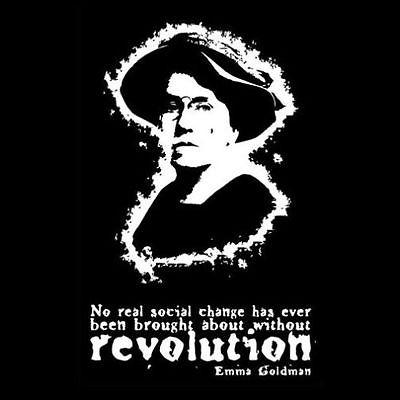2017-12-08
Emma Goldman’s Disillusionment with Marxism-Leninism, Not the Russian Revolution
Originally published by Robert Graham.
Read all our articles about anarchism; here.
Emma Goldman’s Disillusionment with Marxism-Leninism, Not the Russian Revolution
In the chapter on the Russian Revolution in Volume One of Anarchism: A Documentary History of Libertarian Ideas, I included excerpts from the Afterword to Emma Goldman’s My Further Disillusionment with Russia (originally published in 1924). But as Emma Goldman noted in a handwritten inscription to the book, what she was disillusioned with was the Bolsheviks (today known as “Marxist-Leninists”), who had strangled the Revolution, not with the Russian Revolution, which had begun with such great promise.
In today’s post, I include the beginning of Goldman’s Afterword, where she refers to the Marxist dogma that a socialist revolution can only occur in advanced capitalist societies, which became an excuse for the Marxist dictatorship in Russia, as the Communists bludgeoned the Russian people into the 20th century. Far from representing the next stage in historical development, the Communist dictatorship in the Soviet Union represented a brutal process of forced industrialization that created a form of state capitalism, paving the way neither for socialism nor communism, but for the restoration of capitalism after the collapse of the Soviet Union (see the article by the the Russian anarcho-syndicalist group, the Interprofessional Workers’ Union, “Russian Capitalism,” in Volume Three of my Anarchism anthology).
Robert Graham


Marxism v. the Russian Revolution
Non-Bolshevik Socialist critics of the Russian failure contend that the Revolution could not have succeeded in Russia because industrial conditions had not reached the necessary climax in that country. They point to Marx, who taught that a social revolution is possible only in countries with a highly developed industrial system and its attendant social antagonisms. They therefore claim that the Russian Revolution could not be a social revolution, and that historically it had to evolve along constitutional, democratic lines, complemented by a growing industry, in order to ripen the country economically for the basic change.
This orthodox Marxian view leaves an important factor out of consideration — a factor perhaps more vital to the possibility and success of a social revolution than even the industrial element. That is the psychology of the masses at a given period. Why is there, for instance, no social revolution in the United States, France, or even in Germany? Surely these countries have reached the industrial development set by Marx as the culminating stage. The truth is that industrial development and sharp social contrasts are of themselves by no means sufficient to give birth to a new society or to call forth a social revolution. The necessary social consciousness, the required mass psychology is missing in such countries as the United States and the others mentioned. That explains why no social revolution has taken place there.
In this regard Russia had the advantage of other more industrialized and “civilized” lands. It is true that Russia was not as advanced industrially as her Western neighbours. But the Russian mass psychology, inspired and intensified by the February Revolution, was ripening at so fast a pace that within a few months the people were ready for such ultra-revolutionary slogans as “All power to the Soviets” and “The land to the peasants, the factories to the workers.”
The significance of these slogans should not be underestimated. Expressing in a large degree the instinctive and semi-conscious will of the people, they yet signified the complete social, economic, and industrial reorganization of Russia. What country in Europe or America is prepared to interpret such revolutionary mottoes into life? Yet in Russia, in the months of June and July 1917, these slogans became popular and were enthusiastically and actively taken up, in the form of direct action, by the bulk of the industrial and agrarian population of more than 150 million. That was sufficient proof of the “ripeness” of the Russian people for the social revolution.
As to economic “preparedness” in the Marxian sense, it must not be forgotten that Russia is preeminently an agrarian country. Marx’s dictum presupposes the industrialization of the peasant and farmer population in every highly developed society, as a step toward social fitness for revolution. But events in Russia, in 1917, demonstrated that revolution does not await this process of industrialization and — what is more important — cannot be made to wait. The Russian peasants began to expropriate the landlords and the workers took possession of the factories without taking cognizance of Marxian dicta. This popular action, by virtue of its own logic, ushered in the social revolution in Russia, upsetting all Marxian calculations. The psychology of the Slav proved stronger than social democratic theories.
That psychology involved the passionate yearning for liberty nurtured by a century of revolutionary agitation among all classes of society. The Russian people had fortunately remained politically unsophisticated and untouched by the corruption and confusion created among the proletariat of other countries by “democratic” liberty and self-government. The Russian remained, in this sense, natural and simple, unfamiliar with the subtleties of politics, of parliamentary trickery, and legal makeshifts. On the other hand, his primitive sense of justice and right was strong and vital, without the disintegrating finesse of pseudo-civilization. He knew what he wanted and he did not wait for “historic inevitability” to bring it to him: he employed direct action. The Revolution to him was a fact of life, not a mere theory for discussion.
Thus the social revolution took place in Russia in spite of the industrial backwardness of the country. But to make the Revolution was not enough. It was necessary for it to advance and broaden, to develop into economic and social reconstruction. That phase of the Revolution necessitated fullest play of personal initiative and collective effort. The development and success of the Revolution depended on the broadest exercise of the creative genius of the people, on the cooperation of the intellectual and manual proletariat. Common interest is the leit motif of all revolutionary endeavour, especially on its constructive side. This spirit of mutual purpose and solidarity swept Russia with a mighty wave in the first days of the October/November Revolution. Inherent in that enthusiasm were forces that could have moved mountains if intelligently guided by exclusive consideration for the well-being of the whole people. The medium for such effective guidance was on hand: the labour organizations and the cooperatives with which Russia was covered as with a network of bridges combining the city with the country; the Soviets which sprang into being responsive to the needs of the Russian people; and, finally, the intelligentsia whose traditions for a century expressed heroic devotion to the cause of Russia’s emancipation.
But such a development was by no means within the programme of the Bolsheviki. For several months following October they suffered the popular forces to manifest themselves, the people carrying the Revolution into ever-widening channels. But as soon as the Communist Party felt itself sufficiently strong in the government saddle, it began to limit the scope of popular activity. All the succeeding acts of the Bolsheviki, all their following policies, changes of policies, their compromises and retreats, their methods of suppression and persecution, their terrorism and extermination of all other political views — all were but the means to an end: the retaining of the State power in the hands of the Communist Party. Indeed, the Bolsheviki themselves (in Russia) made no secret of it. The Communist Party, they contended, is the advance guard of the proletariat, and the dictatorship must rest in its hands. Alas, the Bolsheviki reckoned without their host — without the peasantry, whom neither the razvyoriska, the Tcheka, nor the wholesale shooting could persuade to support the Bolshevik régime. The peasantry became the rock upon which the best laid plans and schemes of Lenin were wrecked. But Lenin, a nimble acrobat, was skilled in performing within the narrowest margin. The new economic policy was introduced just in time to ward off the disaster which was slowly but surely overtaking the whole Communist edifice.
Emma Goldman
Enough is Enough
Länk: https://enoughisenough14.org/2017/12/08/emma-goldmans-disillusionment-with-marxism-leninism-not-the-russian-revolution/





